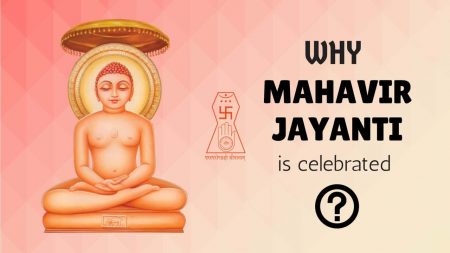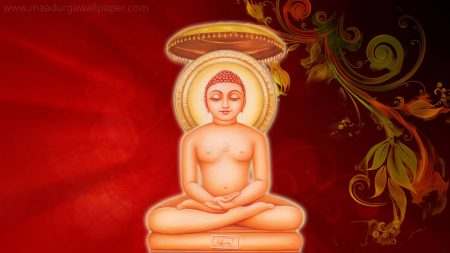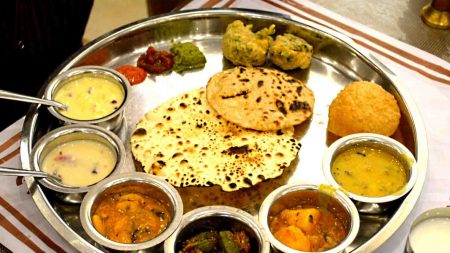Jainism is considered the world’s most peaceful religion. Its main goal is the liberation of the soul from the cycle of birth and death (Maya). To achieve moksha or liberation of the soul, one must observe five great vows:
- Ahimsa or Ahinsa (Non-Violence)
- Satya (Truth)
- Asteya or Achaurya (Not stealing)
- Brahmacharya (Celibacy)
- Aparigraha (Non-possessiveness)
These five great vows must be strictly followed by the monks. There is some concession in strictness of these vows for the householders.
Table of Contents
1. Ahimsa or Ahinsa (Non-Violence):
Ahimsa or Non-Violence is the fundamental or cardinal principle of Jainism. That’s why Jainism is considered to be the most peaceful religion in this world. In Jainism, non-violence is the highest religious duty.
This is the first major vow taken by the Jains, that is to cause no harm to any living being on this planet, whether it is a human being or animal or plants or tiny microorganisms.
Furthermore, non-violence is not constrained to physical violence. Jainism also emphasizes non-violence in speech and thought.
It is believed that causing violence in any form to any living being creates bad Karma which affects one’s rebirth, future well-being, and suffering.
Jainism also emphasizes the fact that violence is not equivalent to actual harm as it may be unintentional.
Violence is simply the intention to harm any individual or any living being, the absence of compassion, unawareness, and the ignorance that makes an action violent. If you don’t have violent thoughts, you won’t do violence to anyone.
As Mahatma Gandhi said:
No religion in the World has explained the principle of Ahimsa so deeply and systematically as is discussed with its applicability in every human life in Jainism. As and when the benevolent principle of Ahimsa or non-violence will be ascribed for practice by the people of the world to achieve their end of life in this world and beyond. Jainism is sure to have the uppermost status and Lord Mahavira is sure to be respected as the greatest authority on Ahimsa.
Vegetarianism in Jainism:
Mainly due to this principle, Jains are strict vegetarians. But practically it is impossible to live without killing or injuring some of the tiniest living organisms. Some lives are killed even when we breathe, drink water, or eat food.
All living beings are categorized according to the five senses that are touch, taste, smell, sight, and hearing.
| One Sense | Touch | plants, water, air, earth, fire, etc. |
| Two Senses | Touch, Taste | worms, leeches, etc. |
| Three Senses | Touch, Taste, Smell | ants, lice, etc. |
| Four Senses | Touch, Taste, Smell, Sight | flies, bees, etc. |
| Five Senses | Touch, Taste, Smell, Sight, Hearing | humans, animals, birds, heavenly and hellish beings |
Jainism believes that for survival, killing is not needed. So it allows common people to use only vegetables (one sense) as their food.
Since all non-vegetarian food is made by killing life forms with two or more senses, therefore the killing of any life form with more than one sense is prohibited. That’s why Jains are strict vegetarians.
MUST-READ: Why Jains are Vegetarians to an extent that they also avoid root vegetables?
2. Satya (Truth):
This is the second vow of Jainism that says always speak the truth, neither lie nor speak what is not true.
Speaking the truth all the time is not an easy task to do. One who is free from anger, greed, fear, jealousy, and ego can only utter the truth in every situation.
Jainism preaches truth should be wholesome and pleasant. It must not hurt anybody’s feelings. Therefore one should remain silent if truth causes pain, anger, or death of any living being.
3. Asteya or Achaurya (Not stealing):
This is the third vow of Jainism. Asteya is the virtue of non-stealing and not wanting to take by force or deceit or exploitation, by deeds or words or thoughts, what is owned by and belongs to someone else.
It simply means one should covet things that belong to others. It says that one should not steal anything from anybody. One should not take something from somebody if it is not willingly given.
Also if one should take aid or help from others, then it should not be more than what is the minimum needed.
It says that one should not steal anything from anybody. One should not take something from somebody if it is not willingly given to them.
Also if one should take aid or help from others, then it should not be more than what is the minimum needed.
There are five transgressions (sins) of this vow which are mentioned in the Jain text which are:
- Prompting someone to steal – prompting someone to steal either directly or through someone or approving of the theft is the first sin.
- Receiving stolen goods – receiving stolen goods from someone or buying it other than the lawful and just means is the second sin.
- Underbuying in a disordered state – an attempt to buy very precious things very cheaply in a disordered state is the third sin.
- Using false weights and measures – cheating other people by using false weights and measures to get more profit is the fourth sin.
- Deceiving others with artificial or imitation goods – selling artificial or imitation goods to someone without telling them, to cheat them and earn more profit is the fifth sin.
4. Brahmacharya (Celibacy / Chastity):
This is the fourth vow of Jainism. Brahmacharya is the virtue of celibacy when unmarried and fidelity (not cheating on one’s spouse) when married.
Celibacy is the total abstinence of sensual pleasures and pleasure of all five senses. It should be strictly practiced by the Jain monks in thought, words, and actions.
As in Jainism sensuality is not only restrained to physical indulgence but one should not think about the pleasure of sensuality. It is one of the most difficult vows to practice as celibacy asserts complete control over oneself.
For householders, brahmacharya simply means fidelity i.e. one should remain sexually faithful to one’s chosen partner.
Also, lay Jains who are unmarried should avoid sex before marriage. Jainism strictly prohibits adultery that is one should not have any physical relationship other than with their spouse (partner).
5. Aparigraha (Non-possessiveness):
This is the fifth vow of Jainism. After Ahimsa, it is the second most important principle of Jainism. Aparigraha is the virtue of non-possessiveness, non-grasping, or non-greediness.
It simply means taking only what is necessary for survival and no more. This Jain vow is the principle of limiting one’s possessions (parimita-parigraha) and limiting one’s desires (iccha-parimana).
It must be strictly observed by the monks and partially by the householders. Monks in Jainism must observe this by giving up all attachments to things such as:
- Relationships – with their father, mother, spouse, children, brother, sister, relatives, friends, etc.
- Material things – wealth, power, property, etc.
- The pleasure of five senses – touch, taste, smell, sight, and hearing.
- Feelings
According to Jainism, one should not be possessive or attached to things or people. One should eat for survival and not for taste.
For householders, one should have only that much amount of wealth that is necessary for their survival and not for showing off or satisfying ego. Also, one should perform its duties towards people but should not be attached to them.
Desires and attachments are the root cause of all the suffering in this world. It makes a person greedy, jealous, egoistic, selfish, and angry. A person who is full of desires would never feel contentment and satisfaction in life.
Difference between Asteya and Aparigraha:
Asteya is the virtue of non-stealing and not wanting to take by force or deceit or exploitation, by deeds or words or thoughts, what is owned by and belongs to someone else.
Aparigraha, in contrast, is the virtue of non-possessiveness and non-clinging to one’s own property.
MUST-READ: What is the difference between Svetambara and Digambara?






